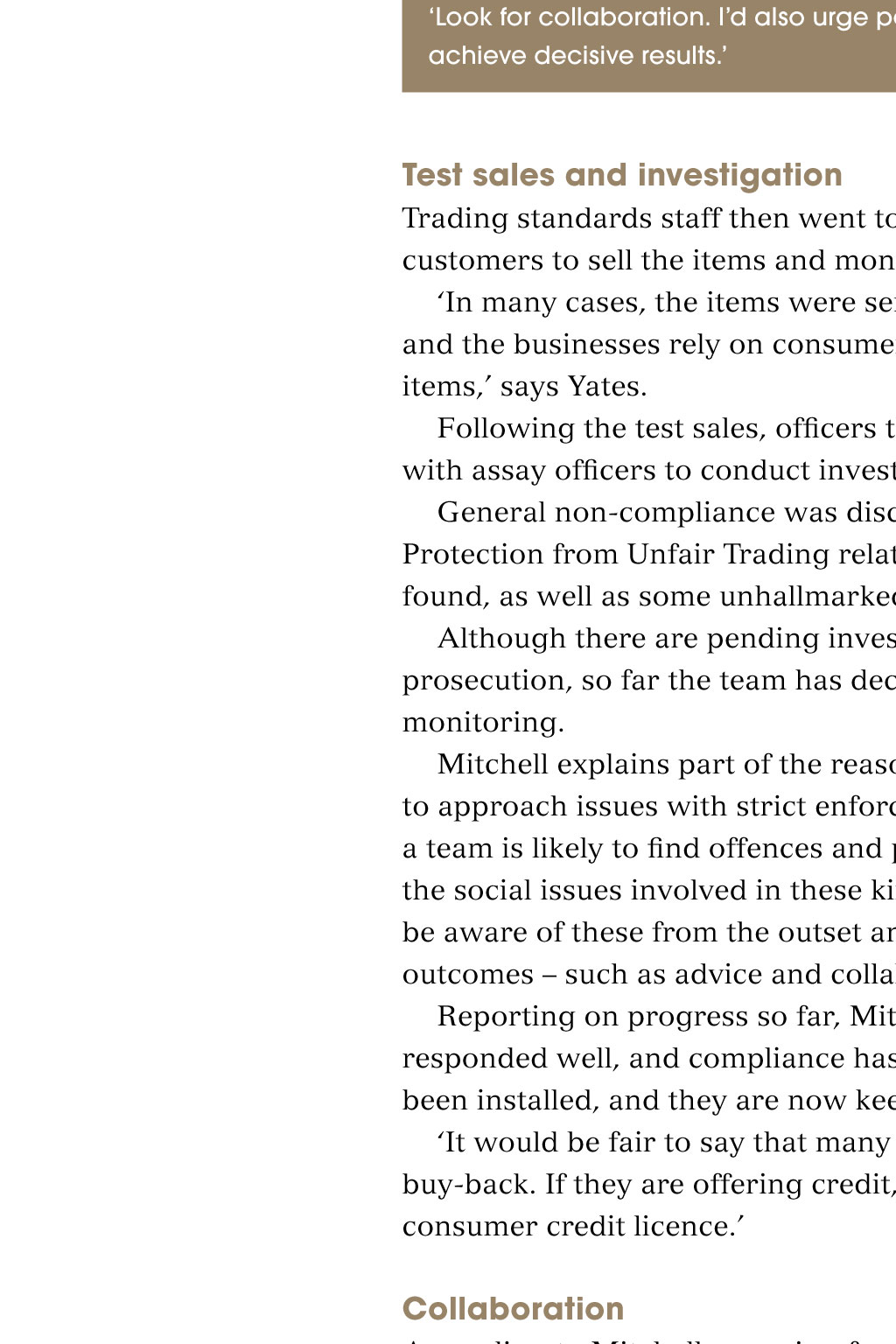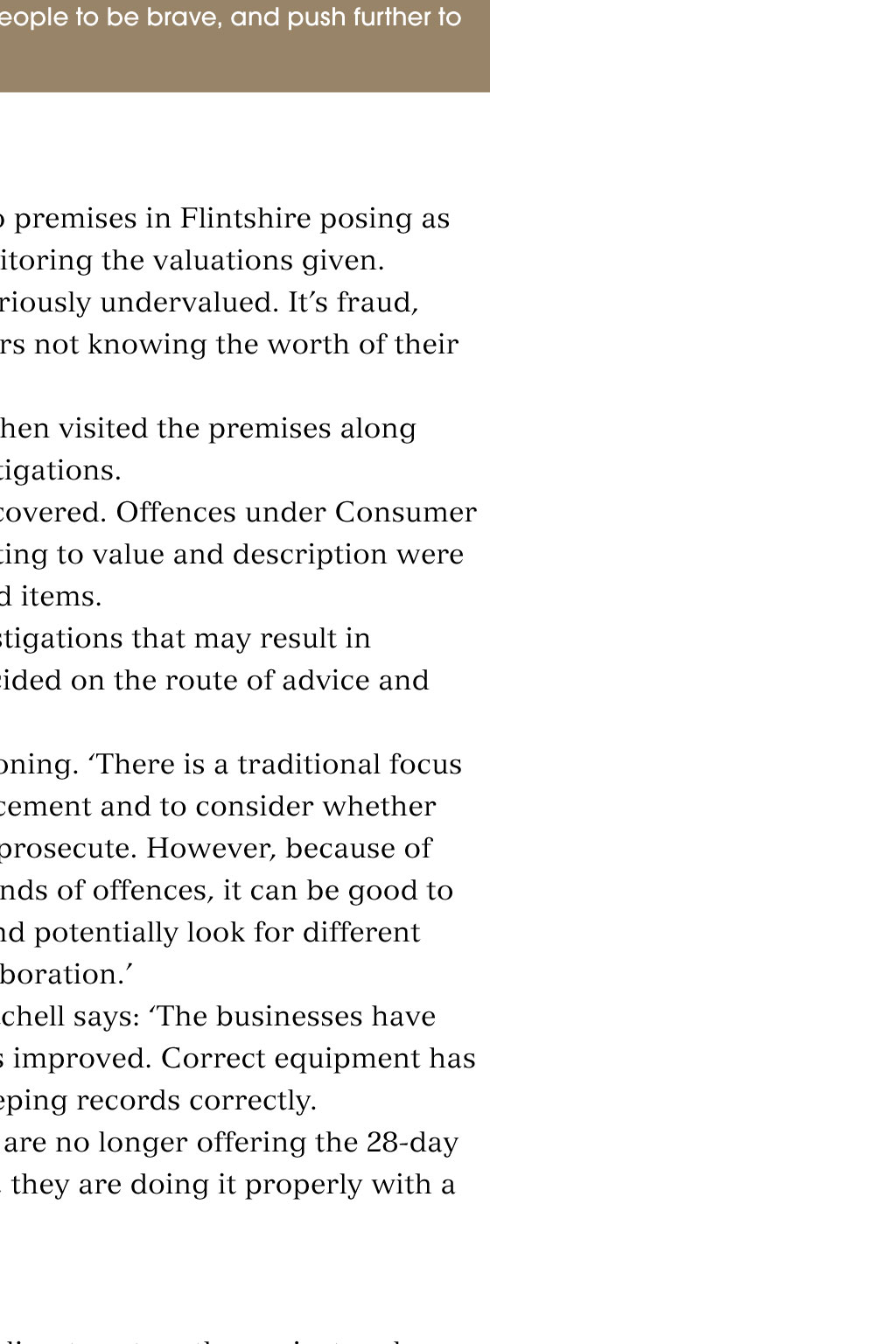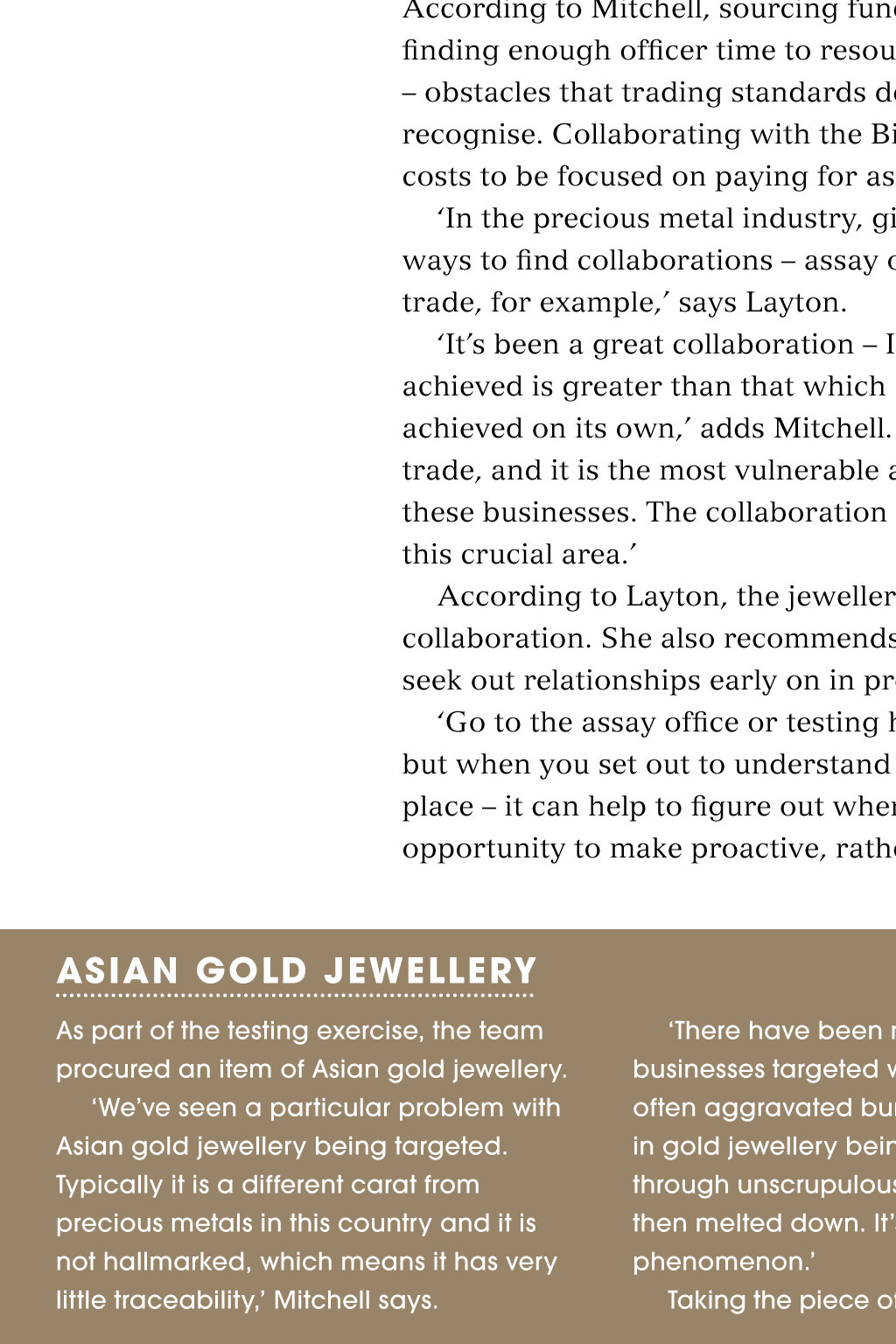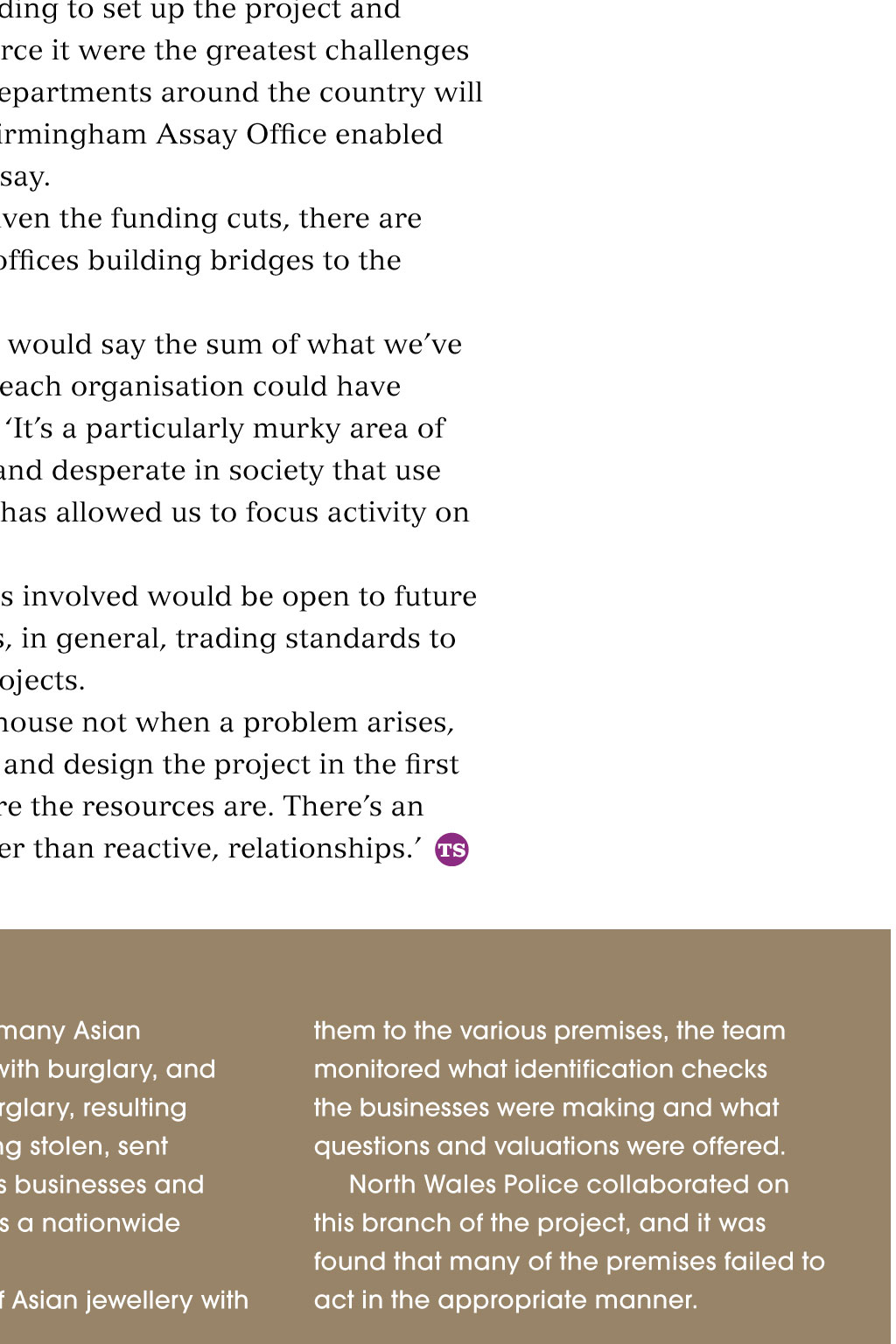


































In this feature l unfair trading l collaboration l unlicensed premises The jeweller, the assayer New ways of working and an innovative test sales project enabled Flintshire Trading Standards and the Birmingham Assay Office to tackle ‘buy-back’ schemes – a new and currently unregulated area of pawnbroking. Maeve Sinnott reports a n d T t h e o f f i c e r est purchases are frequently undertaken by trading standards services – but test sales are much less common. Flintshire Trading Standards, however, used the novel approach as part of its efforts to protect the public from unfair valuations, deception and unreliable consumer credit when pawning items. In a staged project, involving multiple collaborations, Flintshire and the Birmingham Assay Office innovatively sourced, and borrowed, a standardised pool of precious-metal test items from jewellers. These were then assayed and used in test ‘sales’ to monitor unlicensed pawnbrokers in the area. The unusual investigation technique was employed after an initial monitoring project in February 2015, when businesses were checked and advised on the requirements of consumer credit legislation, as well as the Weights and Measures Act and Hallmarking Act. It was suggested by Stella Layton, chief executive and assay master at the Birmingham Assay Office; after years spent working in the precious- metals industry, she knew many jewellers would be willing to help such enforcement by lending out their products. Jack Yates, trading standards officer in Flintshire, says obtaining precious-metal items through the collaboration was beneficial to the project. ‘It’s a great new resource, and we’d definitely repeat the process. We have concentrated on sellers and buyers in the Flintshire area, but there is an awful lot of potential with this kind of project – online, for example.’ Lise Mitchell, team leader for compliance at Flintshire Trading Standards, adds: ‘To go in and pose as consumers selling an item is quite novel; also knowing the value and worth of the item before selling is unusual – it was a back-to-front process really.’ The background The Flintshire Trading Standards team had run a weights and measures-based project in February 2015, after suspicions that unlicensed pawnbrokers in the area were not using accurate weights, raising the risk of scams. The team found evidence of unsuitable weighing machines – crucial because of the volatile values of precious metals – and advised businesses of their responsibilities under legislation relating to weights and measures and hallmarking. Mitchell explains the gravity of the issue: ‘People who go to pawnbrokers are often in need of as much money as possible. They are likely to have bad credit ratings – or not much access to reliable credit – and use ‘buy-back’ schemes as a way to sell items, and then to buy them back when they get access to funds again.’ Buy-back schemes are an unregulated version of pawnbroking (see box, ‘Buy-back schemes’). They hold risks for consumers because they lose ownership of their goods and the legal standing of the scheme remains unclear. ‘We were concerned that people weren’t being given a decent value, and that they were being charged high rates to use the service,’ says Mitchell. ‘It’s an area of concern because it is an issue that affects the most vulnerable people in society. ‘A perception of a high level of non-compliance lay behind the project, rather than direct complaints. ‘Consumers are often unaware of these invisible crimes – most wouldn’t know that the businesses should be using a class two weighing scale, for example.’ delve into discussions The initial project fed into further action. The team planned a testing project, and undertook a stage of discussion and research. Conversations with the Welsh Illegal Money Lending Unit (WIMLU) discussed the issue of 28-day buy-back services, while collaboration with the Birmingham Assay Office was sought. A testing project – to sell items to the unlicensed pawnshops and monitor their actions – was devised. For efficacy, the team needed access to a standardised and valued pool of sample rings, bracelets and earrings. ‘We needed to be in a position where we knew exactly what the items were made of, and what they should be worth. We also needed old items – as new ones would look suspicious,’ says Mitchell. Layton suggested collaborating with jewellers, bringing tradespeople indirectly into the project. She says: ‘The trade is very happy to support projects such as these. Every complaint is a reflection on the industry, and tradespeople don’t want the brand to be undercut. I spoke to a handful of local customers [of the assay office] and they were all happy to help.’ The jewellery items were lent free of charge, under the agreement that they would be returned after all investigations finished. The project funding then went towards valuations of the items, provided by the Birmingham Assay Office. ‘Having an independent valuation is important – if pawnbrokers say one thing, it means you can verify and offer an independent position that holds up,’ Layton explains. Jack Yates, trading standards officer, and trainee officers visit the Birmingham Assay Office to discuss hallmarking and get updates on legislation Test sales and investigation Trading standards staff then went to premises in Flintshire posing as customers to sell the items and monitoring the valuations given. ‘In many cases, the items were seriously undervalued. It’s fraud, and the businesses rely on consumers not knowing the worth of their items,’ says Yates. Following the test sales, officers then visited the premises along with assay officers to conduct investigations. General non-compliance was discovered. Offences under Consumer Protection from Unfair Trading relating to value and description were found, as well as some unhallmarked items. Although there are pending investigations that may result in prosecution, so far the team has decided on the route of advice and monitoring. Mitchell explains part of the reasoning. ‘There is a traditional focus to approach issues with strict enforcement and to consider whether a team is likely to find offences and prosecute. However, because of the social issues involved in these kinds of offences, it can be good to be aware of these from the outset and potentially look for different outcomes – such as advice and collaboration.’ Reporting on progress so far, Mitchell says: ‘The businesses have responded well, and compliance has improved. Correct equipment has been installed, and they are now keeping records correctly. ‘It would be fair to say that many are no longer offering the 28-day buy-back. If they are offering credit, they are doing it properly with a consumer credit licence.’ collaboration According to Mitchell, sourcing funding to set up the project and finding enough officer time to resource it were the greatest challenges – obstacles that trading standards departments around the country will recognise. Collaborating with the Birmingham Assay Office enabled costs to be focused on paying for assay. ‘In the precious metal industry, given the funding cuts, there are ways to find collaborations – assay offices building bridges to the trade, for example,’ says Layton. ‘It’s been a great collaboration – I would say the sum of what we’ve achieved is greater than that which each organisation could have achieved on its own,’ adds Mitchell. ‘It’s a particularly murky area of trade, and it is the most vulnerable and desperate in society that use these businesses. The collaboration has allowed us to focus activity on this crucial area.’ According to Layton, the jewellers involved would be open to future collaboration. She also recommends, in general, trading standards to seek out relationships early on in projects. ‘Go to the assay office or testing house not when a problem arises, but when you set out to understand and design the project in the first place – it can help to figure out where the resources are. There’s an opportunity to make proactive, rather than reactive, relationships.’ Hallmarking: buy-back schemes Buy-Back schemes The 28-day ‘buy-back’ scheme, Mitchell explains, is essentially an unregulated version of pawnbroking. To offer a regulated pawnbroking service, businesses must have a proper consumer credit licence. The agreement must be capable of existing for six months, and the ownership of goods remains with the customer. The pawnbroking business takes goods, and hands over a portion of money to the customer as security; any time over the following six months, the customer can return the amount, pay the service fee and receive their goods back. However, with 28-day buy-back schemes, it is not only a small period of time – which can be extended for high fees – but the ownership of goods actually passes to the business. The item is bought, not held. According to Mitchell, it appears that the scheme often sees customers receiving significantly lower amounts for their goods as well as paying higher fees. The team consulted the Wales Illegal Money Lending Unit and it was confirmed that the legal standing of the scheme remains unclear. Team Tips sTella layTon: ‘Keeping the communications going though the project is key. I get regular communications from Flintshire, and it’s reassuring to be kept in the loop. It gives me a kick to hear about the successes, and means the suppliers can hear about how they’ve helped – which means they are likely to help next time too.’ lise miTchell: ‘Look for collaboration. I’d also urge people to be brave, and push further to achieve decisive results.’asian gold jewellery As part of the testing exercise, the team procured an item of Asian gold jewellery. ‘We’ve seen a particular problem with Asian gold jewellery being targeted. Typically it is a different carat from precious metals in this country and it is not hallmarked, which means it has very little traceability,’ Mitchell says. Credits Maeve Sinnott is a junior reporter for TS Today. Images: Trigger Image/ Alamy ‘There have been many Asian businesses targeted with burglary, and often aggravated burglary, resulting in gold jewellery being stolen, sent through unscrupulous businesses and then melted down. It’s a nationwide phenomenon.’ Taking the piece of Asian jewellery with To share this page, click on  in the toolbar them to the various premises, the team monitored what identification checks the businesses were making and what questions and valuations were offered. North Wales Police collaborated on this branch of the project, and it was found that many of the premises failed to act in the appropriate manner. You might also like Tip of the iceberg – February 2016 In this feature l unfair trading l collaboration l unlicensed premises The jeweller, the assayer and the officer Hallmarking: buy-back schemes Trainee officers visit the Birmingham Assay Office to discuss hallmarking and get updates on legislation Trainee officers visit the Birmingham Assay Office to discuss hallmarking and get updates on legislation Jack Yates, trading standards officer, and trainee officers visit the Birmingham Assay Office to discuss hallmarking and get updates on legislation